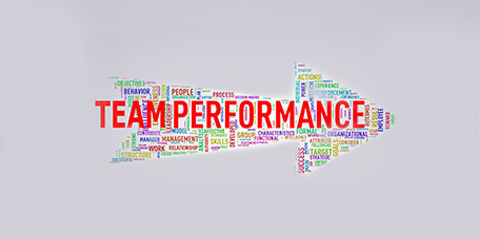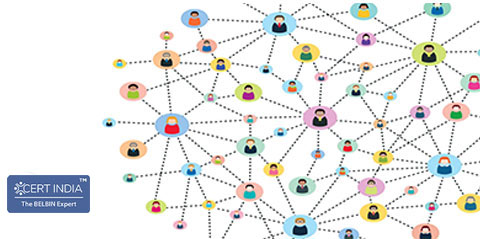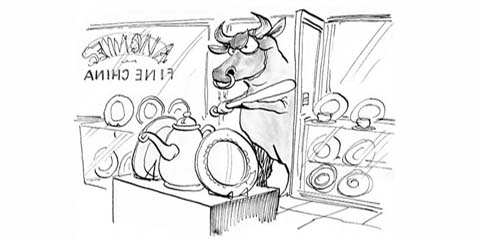Eight Reasons Why Behaviour Is Important
Belbin measures propensities towards certain kinds of behaviour and styles of interaction with others, rather than personality traits.
There are a number of factors underlying behaviour: personality, motivation, values, abilities and environment, to name a few. So why measure behaviour in particular?
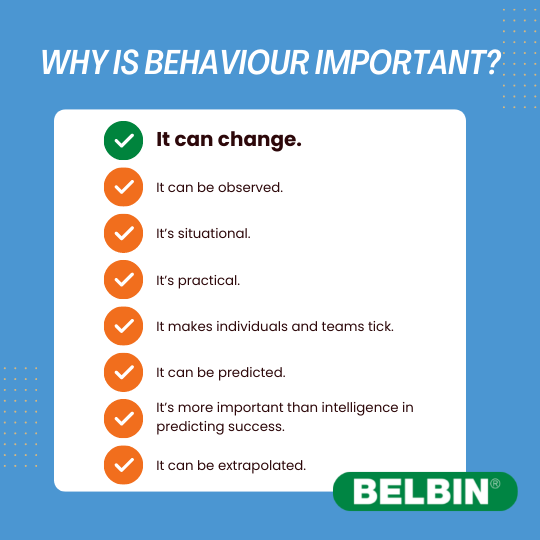
1. It can change.
Pandits of managing change know, that change begins within. That means working on that part of oneself that one can change. Personality is fixed and unlikely to change, so it makes sense to focus our efforts at the point where changes can be made: our behaviour. Since behaviour is within our locus of control, affirmative feedback on behaviour offers a positive lead for personal development, showing where and how we can adapt to meet the needs of a particular situation or job role.
2. It can be observed.
What can't be measured, can't be managed. And, if what is measured is observable by one and all, it makes the feedback that much more acceptable. Such ready acceptance of what's obesrvable, stands to trigger quick and meaningful change.
Personality is what’s on the inside; behaviour is what comes out. Behaviour affects – and is affected by – those around us. Measuring behaviour allows us to focus on the words and actions which shape our interactions with others. Arguably, we aren’t experts on someone else’s personality – we don’t know what’s going on "behind the scenes" – but we can comment on what we can see before us.
By giving and receiving feedback on behaviours within a team, we move to a democratic, evidential process. We can corroborate – or disagree with – one another, and provide evidence of the behaviours in question from our own experience. This can depersonalise difficult conversations and take the heat out of conflicts which might otherwise descend into ad hominem attacks. It can also provide a significant learning opportunity – your observers might uncover strengths you didn’t know you possessed.
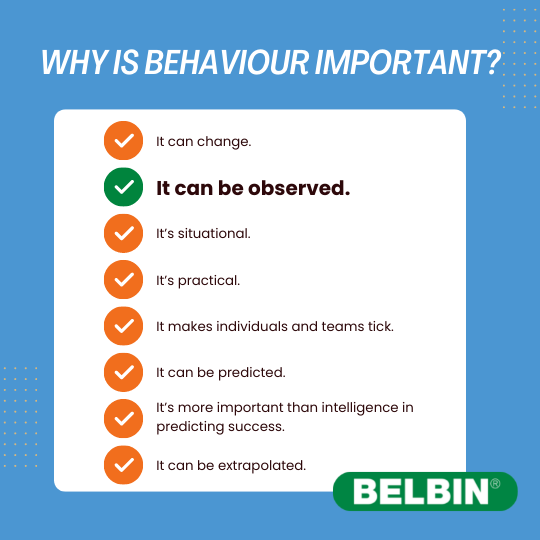
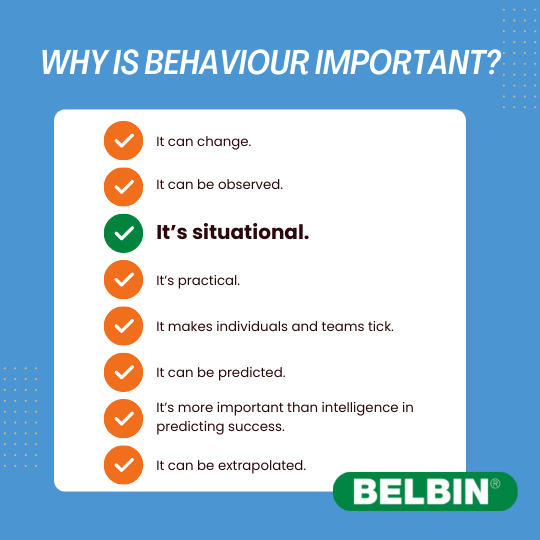
3. It’s situational.
Our behavioural tendencies influence the kinds of work we might be best suited to, and who we work best with. Some people behave very differently at work than they do at home, despite the underlying personality being one and the same. Measuring behaviour in a particular context allows discussion to focus on the workplace, whereas more wide-ranging measurements might muddy the waters.
4. It’s practical.
Self awareness is not about stereotyping. Is not about displaying conceptual brilliance and using sophisticated lingo, that some experts understand better than we do as simple people. To do that, is to limit the infinite potential we all have to influence our future.
So, Belbin isn’t a label to apply or a box to put someone in, it’s a language designed to help people better understand each other. Once people experience the power of simplicity in the Belbin Team Roles Methodology, this language can be used as a shorthand to describe how different kinds of work might be approached or what sort of contributions are required at a particular meeting.
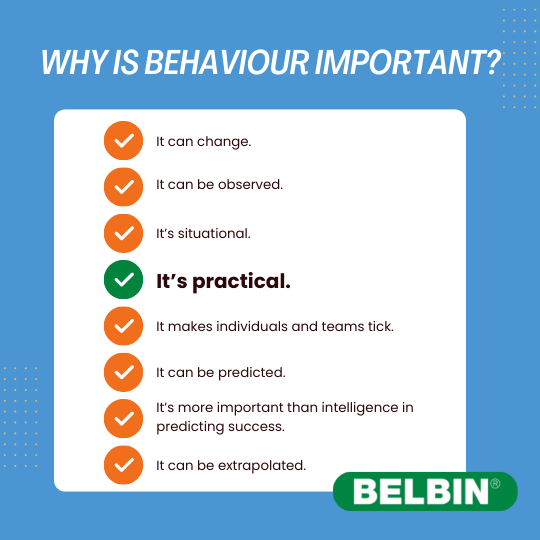
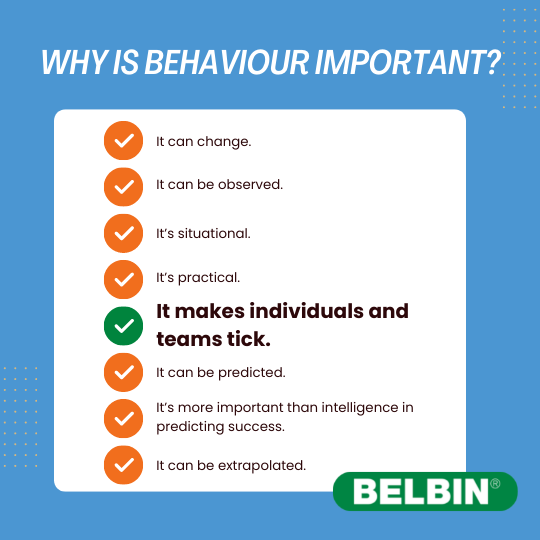
5. It makes individuals and teams tick.
Understanding strengths and weaknesses makes people more engaged, happier and more productive at work, promoting a positive working environment and reducing turnover costs. In 2013, Gallup reported that only 13% of employees were engaged at work. In 2016, their findings showed that teams in the top quartile for engagement outperformed those in the bottom quartile by 21%. In another 2016 study, Harvard Business School outlined the importance of "relational affirmation" in this process: identifying and communicating individual strengths, and using a common language and frame of reference.
6. It can be predicted.
Since we can observe behaviour, we can predict it too. People may not always behave as we expect in every little way – as human beings, we always possess the capacity to surprise one another – but broadly speaking, we settle into ways of working, communicating and relating to others that can be expected to remain the same over a period of time. This means we can use behavioural styles for recruitment and teambuilding, to suggest whether someone might be a good fit for a particular job role or to join an existing team.
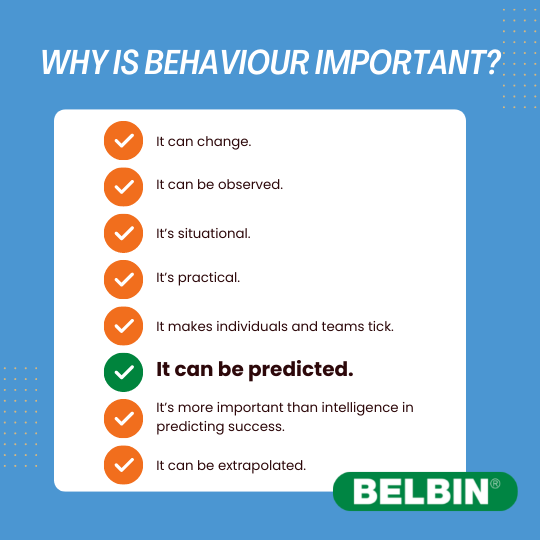
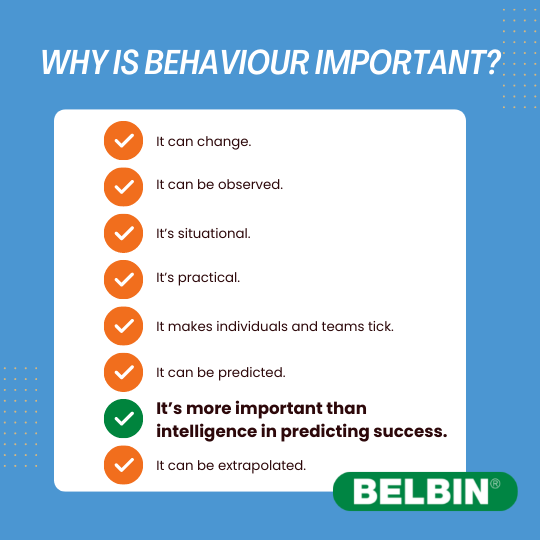
7. It’s more important than intelligence in predicting success.
"The best way to build a great team is not to select individuals for their smarts or accomplishments but to learn how they communicate and to shape and guide the team so that it follows successful communication patterns." - "The New Science of Building Great Teams", Alex "Sandy" Pentland, April 2012
As part of his original research at Henley Management College during the 1970s, Dr Belbin set up so-called "Apollo teams", composed of those individuals who had achieved the highest scores on a battery of intelligence tests. Almost without exception, these teams were the worst performers, owing to competitiveness and negativity within the teams. This initial finding spurred Dr. Belbin on to discover which qualities did predicate success – and Team Role theory was the result.
8. It can be extrapolated.
Personality comes down to the individual – it’s their outlook on the world. By its very nature, behaviour is more fluid and interconnected with others, so it lends itself naturally to collation. We can aggregate key Team Role information to design and build teams, or map the behavioural preferences of two individuals to examine how well a partnership might work.
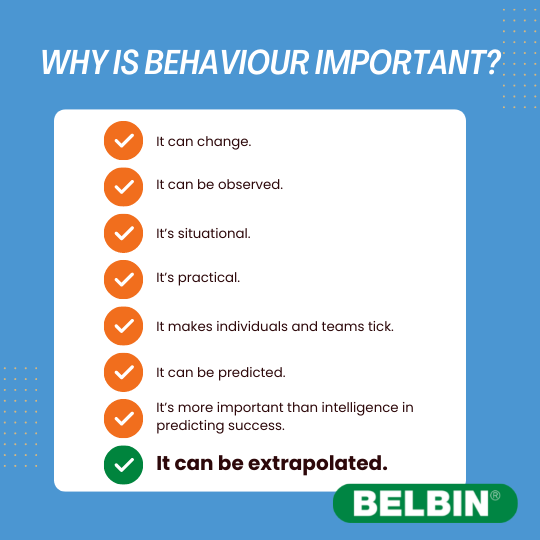
Next Steps
You can find out your strengths and weaknesses in behavioral language by completing the Belbin Self-Perception Inventory online and asking for feedback from your work colleagues. This generates a Belbin Individual report which offers in-depth insights into your own behavioral preferences, personalised advice and guidance that are valuable in transforming your personal effectiveness at work.
Let's keep making BELBIN Happen!
Here are some quick and easy ways for you to get started with BELBIN. Pick the option that best speaks of your interest
- Keep me updated on upcoming events & latest insights from the Belbin world on transforming performance of people and teams
- Let me begin by downloading a 2 Pager on the nine BELBIN Team Roles
- Let me begin by downloading sample of a Belbin Individual Report
- I want to transform my personal effectiveness at work. Tell me how I can get my BELBIN Individual Report done.
- I want to get BELBIN Accredited. Tell me how.














